Dealing with a cat that has taken a liking to urinating on the carpet can be stressful and bewildering. You’ve tried scolding, cleaning, and maybe even rearranging furniture, but the issue persists.
So, how to stop cat from peeing on carpet? You can find effective solutions to keep your floors fresh here!
Have you wondered why your feline friend is so fond of the carpet, despite the litter box being steps away?
It’s a common problem that baffles many cat owners, and the reasons behind it are as varied as they are complex.
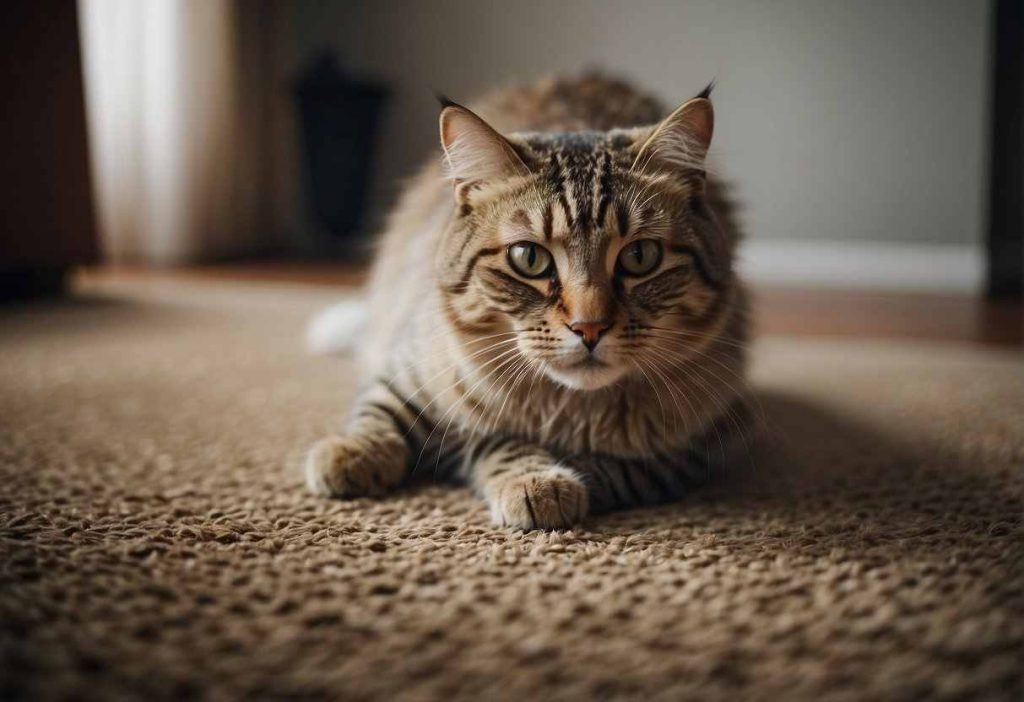
Cats may choose to pee outside their litter box for a range of reasons, including medical issues, stress, or environmental changes. (1)
Perhaps your cat is feeling anxious due to a new pet in the house, or maybe they have a urinary tract infection that makes it painful to use the litter box. (2)
Understanding the underlying cause is the first step toward fixing the issue.
The good news is, there’s hope.
By harnessing expert advice and practical solutions, we can address this unpleasant behavior.
The goal here is not just to guide you through clean-up. It’s about equipping you with the tools and knowledge to prevent future incidents, improving both your cat’s well-being and your own peace of mind.
Remember, you’re not alone in this—there is a community of cat lovers who have navigated these choppy waters before, and their wisdom can serve as your north star.
Key Takeaways
- Identifying the cause of a cat’s inappropriate urination is critical.
- Medical, behavioral, and environmental factors all play a role.
- Prevention and consistent practice lead to long-term solutions.
Stop Cat from Peeing on Carpet: Implementing Solutions and Monitoring Progress
Immediate action is crucial to deter your feline friend from turning this bad habit into a routine. Here’s what you need to do:
- Clean the area thoroughly with an enzyme cleaner to eliminate odors.
- Restrict your cat’s access to the soiled carpet until the cleaning ritual is complete.
Immediate Action Checklist:
- Identify and clean soiled spots
- Sniff out trouble spots or use a UV light.
- Blot fresh stains, then apply an enzyme cleaner. (3)
- Give it time to work; follow product instructions.
- Prevention tactics
- Place a litter box nearby as an appropriate alternative.
- Use carpet runners or furniture rearrangement to block access.
Got those steps ticked off? Great! Now, onto the monitoring phase!
Tracking Feline Behavior:
- Keep a daily log of your cat’s bathroom habits.
- Note any repeat offenses in specific locations.
Observing your cat’s actions can speak volumes; health issues often manifest through changes in litter box habits, so take notes and consult your vet if you spot any worrisome patterns.
- Adjust litter box placement or try different types of litter.
- Increase playtime and interaction to relieve stress and anxiety. (4)
Remember, patience is your best friend in this process, and consistency is key.
Applying these steps won’t just help your carpet, they might also lead to a happier, healthier companion in the long run.
Tailoring Solutions to Your Cat’s Needs
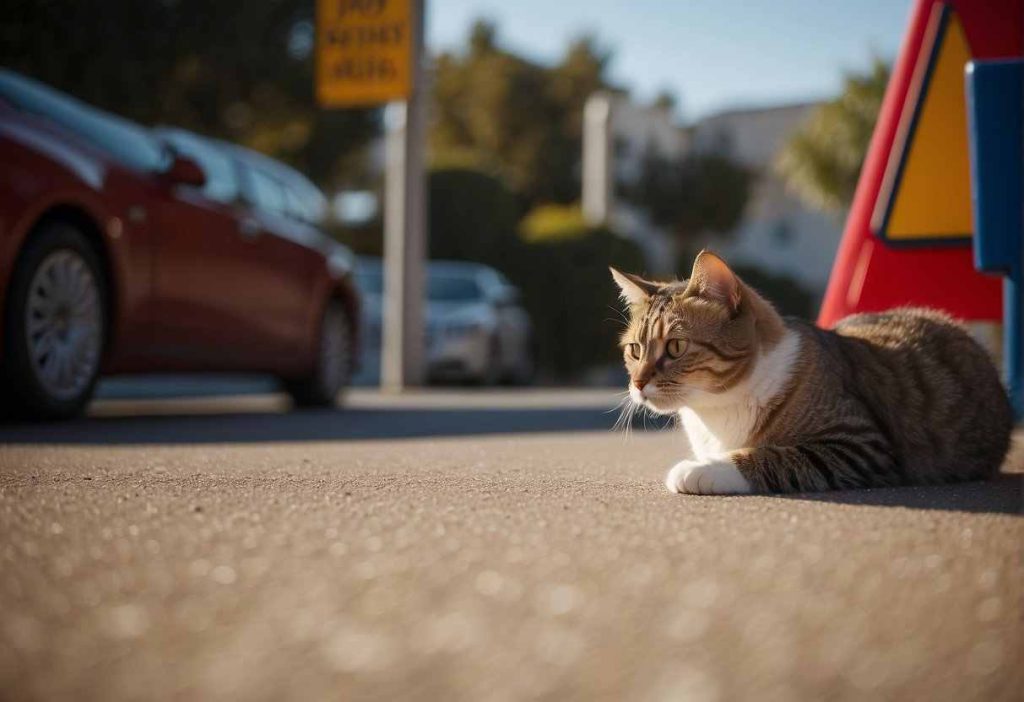
Behavioral Modification Techniques:
- Positive Reinforcement: Reward your cat for using the litter box. Treats or praise right after the deed can work wonders! (5)
- Gradual Changes: Remember, cats aren’t fans of sudden shifts in their environment. Introduce new litter or boxes slowly.
Tackling Anxiety: Is your cat a scaredy-cat? Stress may be the culprit. Keep your home calm and consider pheromone diffusers or toys that can help them chill out.
Age and Breed-Specific Advice:
- Kittens: They may need more frequent reminders and easy-access litter boxes.
- Adult Cats: Ensure the litter box is always clean; some cats are real sticklers for hygiene.
- Seniors: Arthritis can make it hard for them to climb into high-sided boxes. A lower entry point helps. (6)
Breed-Specific Traits:
- Some breeds have quirks! Long-haired breeds might require different litter to prevent sticking.
Remember, each cat is an individual. What works for the energetic Bengal might not sit well with the laid-back Persian.
Keep a close eye on your fur baby’s habits; often, they’re communicating in their own mysterious ways. Your mission: decode those signals and provide the purr-fect solution!
Comprehensive Guide to Prevention and Maintenance
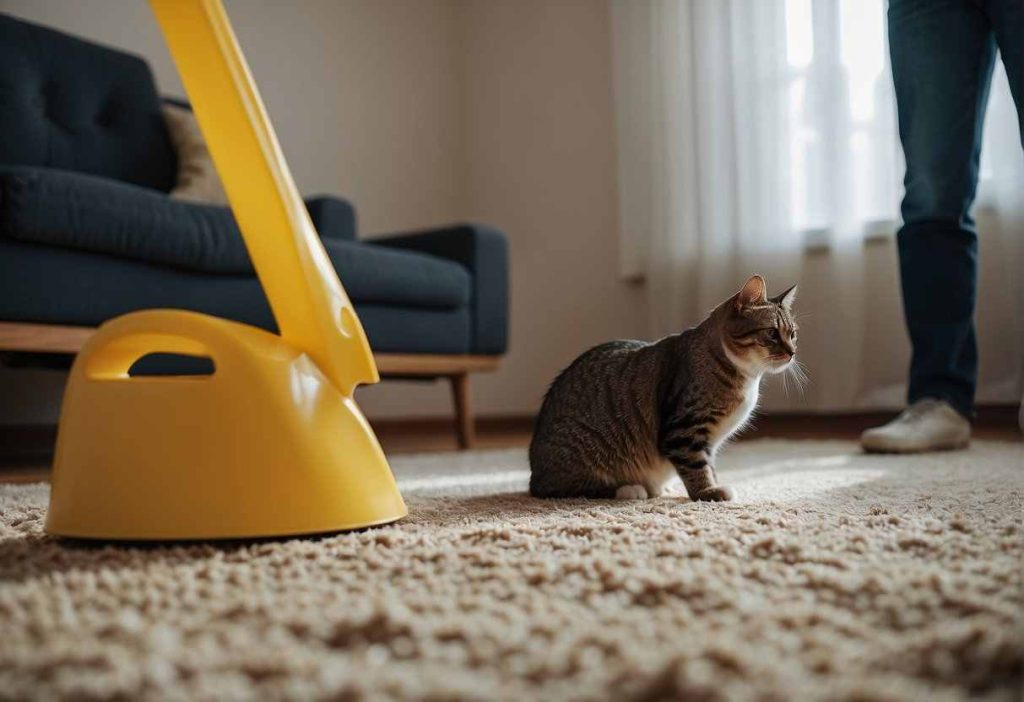
Preventive Strategies for a Healthy Environment:
- Think of your home as a cat’s kingdom. Does yours feel safe and peaceful? Make their environment stress-free by keeping it stable and serene.
- Seen those fancy cat condos? Cats love high perches. It helps them feel secure and in control. Got one yet?
- How about litter boxes? The golden rule is one per cat plus one extra. Ensure they’re accessible and placed in quiet locations.
- Regular cleaning of these boxes is like scoring brownie points with your kitty. Stick to a routine.
Product Recommendations and Reviews:
| Litter Type | Pros | Cons | Recommended For |
|---|---|---|---|
| Clumping | Easy to clean | Can be dusty | Quick daily maintenance |
| Non-clumping | Cheaper | More frequent changing required | Budget-friendly homes |
| Crystal | Great odor control | More expensive | Households with one cat |
| Recycled paper | Environmentally friendly | Not as effective at odor control | Eco-conscious owners |
Boxes:
- Large, open-topped ones allow for easy access and are great for large breeds or cats who dislike confined spaces.
- Consider an automatic box if you’re often out. They take care of replying to nature’s calls for you.
Cleaners:
- Enzymatic cleaners work wonders. They break down the stain and neutralize odors.
- Before you buy, sniff around for reviews. Fellow cat owners’ experiences are like gold.
And always remember, a happy cat equals a clean carpet! Keep it consistent, warm, and welcoming, and your feline friend should steer clear of unwanted spots.
Understanding the Root Causes of Inappropriate Urination
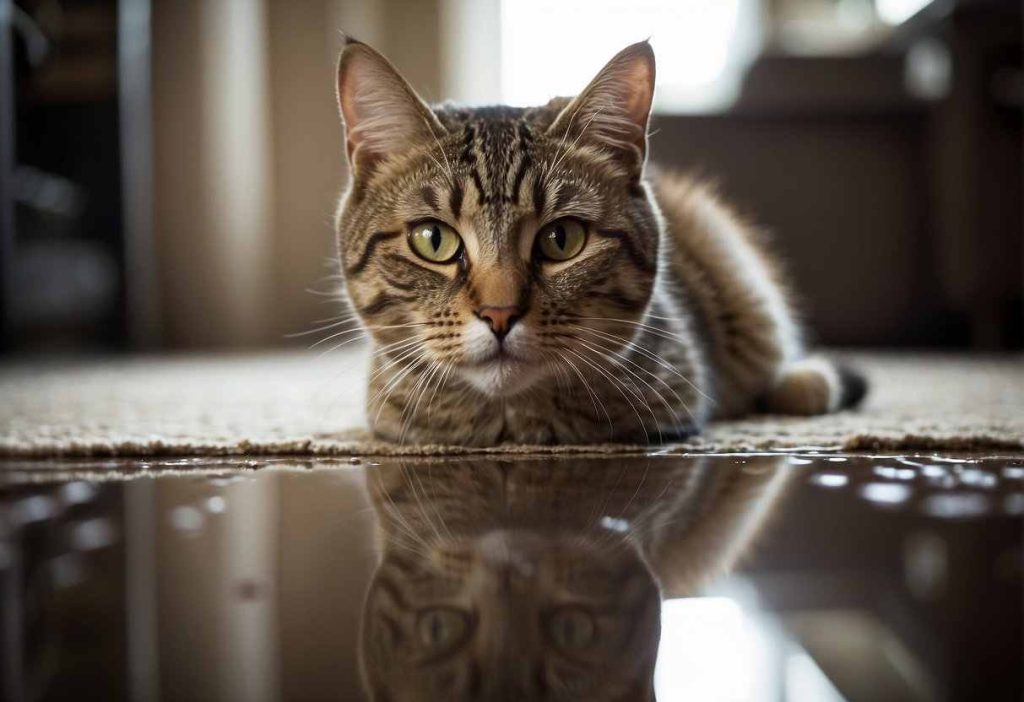
Medical Insights and Diagnosis
Why is your purring friend choosing the carpet over the litter box? Let’s get to the bottom of this! It’s critical to check off medical issues first. Could be a sneaky UTI or something else entirely!
A quick trip to the vet is key—don’t worry, your kitty won’t hold a grudge for long.
They’ll do some tests and chat with you to get the full scoop. Here’s what might happen:
- Urine tests: To rule out infections or kidney trouble
- Blood work: Because sometimes issues aren’t visible
- Physical examination: Sometimes the clues are in the body!
Behavioral and Environmental Factors
It’s a mystery sometimes, right? Is your feline friend stressed, or just picky?
Different factors influence their behavior, like:
- Age: Both kittens and seniors have their quirks.
- Breed: Some are more… shall we say, particular than others?
When your home becomes a jungle, look out for:
- New pets that might be causing a stir.
- Moving furniture: Cats are creatures of habit!
- Loud noises: Party next door? Could be a problem.
Remain calm, and remember, every cat is an individual with unique needs and preferences.
By understanding the why, you’re halfway to solving the puzzle—yay you!
Advanced Medical Treatments and Insights
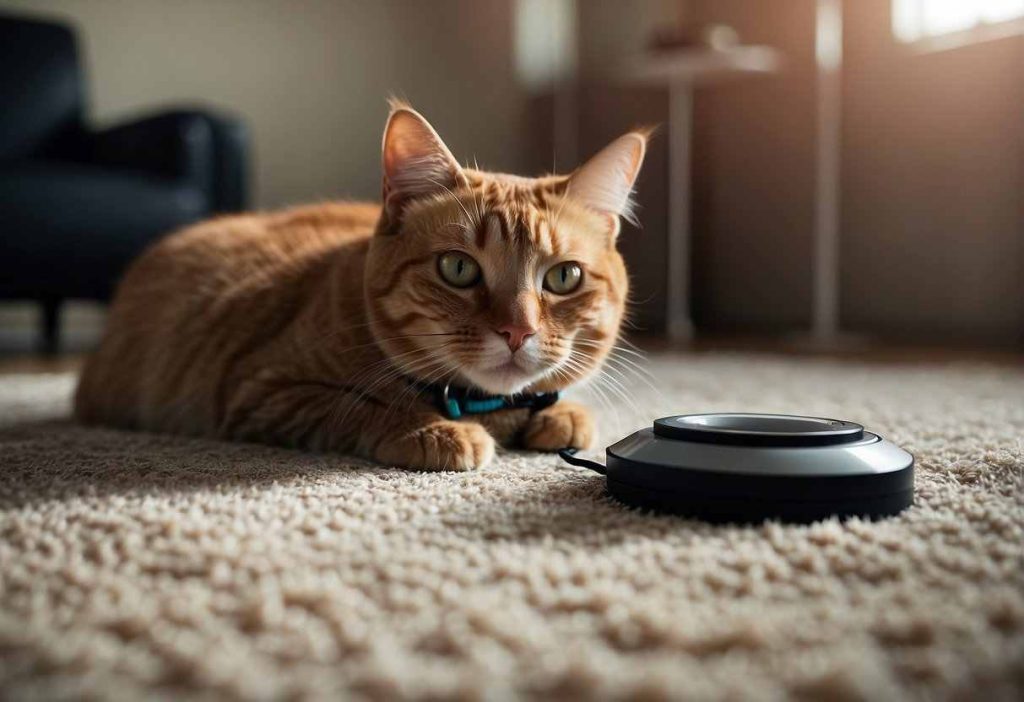
Sometimes, our furry friends need medical intervention, and that’s where the latest advancements come into play.
There are some intriguing options at your disposal, and who knows, maybe one of these could be the game-changer for your feline companion.
If your cat’s been ruling over that carpet with an iron paw, it might be time for a specialist to step in. Did you know that sometimes behavior issues are rooted in medical concerns?
That’s right; a urinary tract infection or bladder stones could be the culprit.
When to Visit a Specialist
- Consistent accidents despite training
- Signs of pain or distress
- Blood in urine
Innovative Treatments:
- Anti-Anxiety Medications
- Pheromone Therapies
- Acupuncture
- Dietary Adjustments
A vet specializing in feline medicine may recommend treatments like pheromone diffusers, which can soothe your cat’s nerves and potentially keep them away from the carpet.
It’s fascinating, really— think of it as a kitty aromatherapy! In more stubborn cases, a feline behaviorist could be your ally.
These experts can dive deep into your cat’s psyche, uncovering reasons for their rebellion. They might suggest modifications in your home or to your routine that you haven’t thought of.
Lastly, keep an eye on your cat’s health. Quick action often leads to simpler solutions.
Early detection and treatment can save your carpet and your cat a lot of stress, so don’t hesitate to reach out for help when you need it.
Remember, your vet is just a phone call away, and they’re as invested in your cat’s well-being as you are!
Real-Life Success Stories and Emotional Support
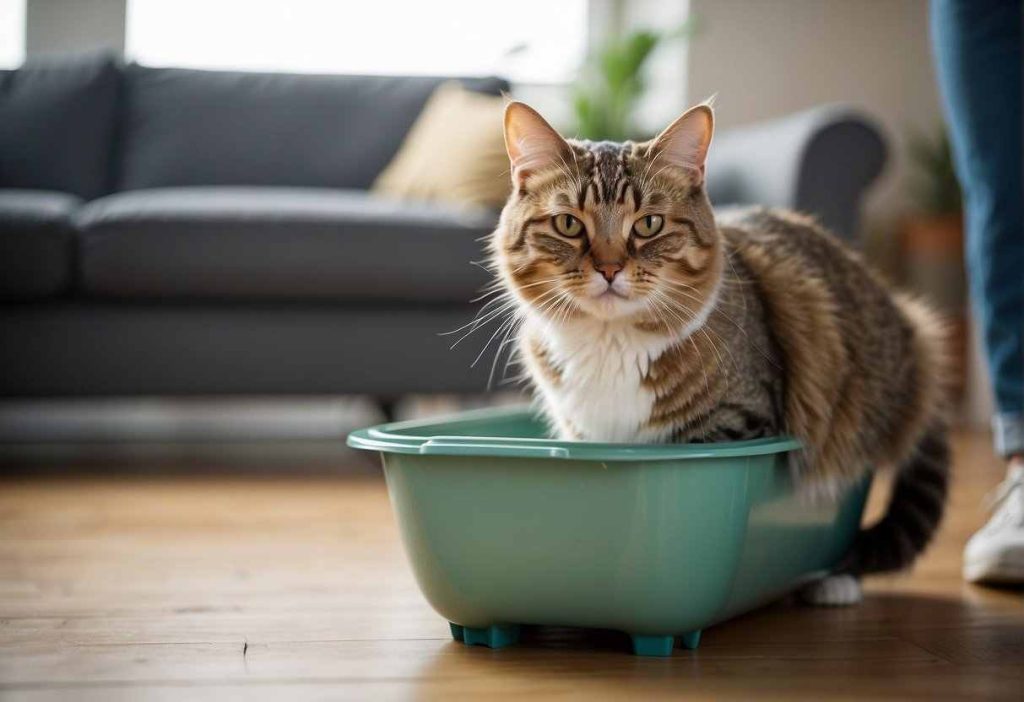
Many cat owners share the frustration of their cat peeing on the carpet, but there’s hope.
Take Sarah, for instance. She was close to giving up after her Persian cat, Whiskers, seemed to have a vendetta against her new living room rug.
After trying several solutions, Sarah sought advice on an online community forum. There she received a game-changing tip: providing extra litter boxes.
Now Whiskers is a changed kitty, and her carpet is pristine!
Table of Heartening Outcomes:
| Cat Owner | Problem | Solution | Result |
|---|---|---|---|
| Sarah | Peeing on carpet | Extra litter boxes | Clean rug |
| Mike | Cat marks territory | Feliway diffuser | No more marking |
| Emma | Stress-induced accidents | Increased playtime | Happy, ‘accidents’-free cat |
Why not take a page out of their book? Trying other people’s successful methods could spare your carpet from unwanted ‘presents.’
Remember, the emotional rollercoaster is real when dealing with this issue. Don’t discount the comfort and solidarity found in support groups or forums.
Whether you want to share your win, ask for help, or simply vent, there’s a place for you. Fellow cat lovers are ready to lend an ear and offer a virtual shoulder to lean on.
The collective wisdom of these communities could be just the touchstone you need to turn the tide on your carpet woes.
Keep your chin up; with a bit of patience and some good advice, you can conquer this challenge together with your kitty companion!
Expert Insights and Professional Endorsements

Dr. Meowington, a renowned veterinarian with over 10 years of experience, suggests:
- Identifying Stressors: Cats often pee outside the litter box because of stress. Don’t you find relief in comfort food? Cats find theirs in marking their territory.
- Health Check-Up: She emphasizes checking for urinary tract infections or kidney issues. “If your cat starts peeing on the carpet suddenly, it’s time for a vet visit,” she says. (7)
A checklist before visiting your vet might include:
- Changes in behavior
- Frequency of accidents
- Food and water intake
Behaviourist Whisker Wiseman recommends:
- Litter Box Training: “Go back to basics with litter training. Like teaching a kid to ride a bike, sometimes a refresher is necessary.”
- Environmental Enrichment: “Cats need stimulation. Try new toys or scratching posts to keep them entertained – think cat Disneyland.”
A table for quick reference:
| Professional | Advice | Contact Info |
|---|---|---|
| Dr. Meowington | Identify stressors, health check-ups | drmeow@vetclinic.com |
| Wiseman | Litter training, environmental enrichment | whiskerwisdom@catbehavior.com |
Remember, if you’re dealing with this issue, seek professional help. It’s like calling a plumber for a leak; get the expert for cat leaks too!
Keep your cat’s health and happiness your top priority, because a happy cat means a pee-free carpet!
Quick Recap
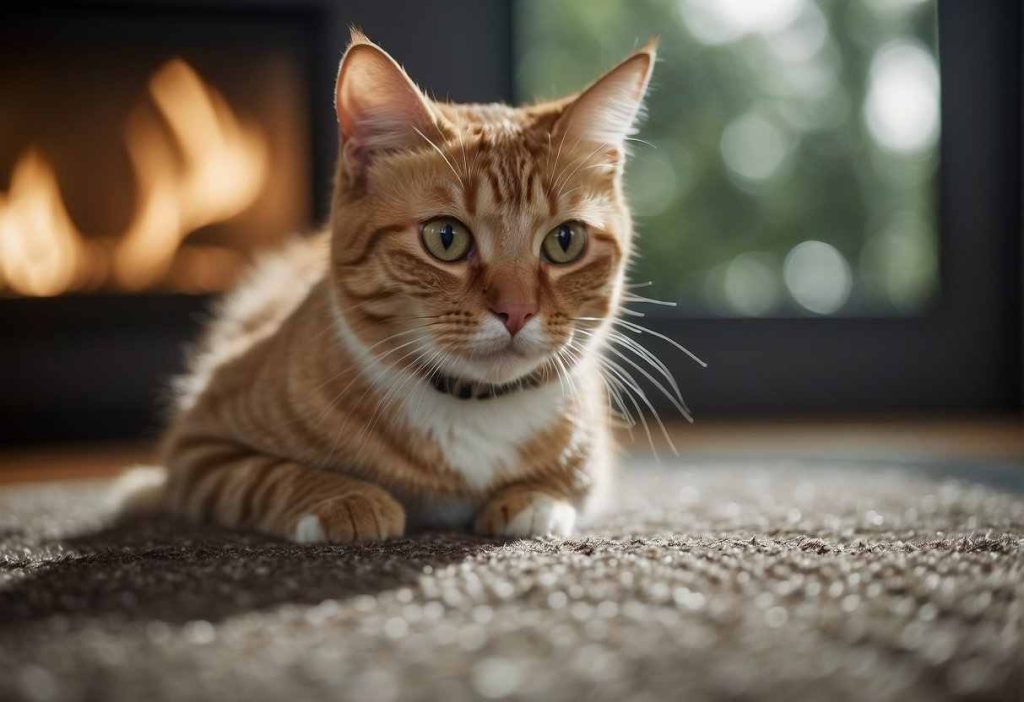
Let’s quickly sum up the crucial steps you need to take to keep your carpets dry and clean.
- Identify the Cause: Firstly, determine why your cat might be avoiding their litter box. Could it be medical, or behavioral, or is the litter box not up to their standards?
- Veterinary Check: A trip to the vet can rule out any health issues, like a urinary tract infection, which may be causing the trouble.
- Litter Box Etiquette: Keep that litter box squeaky clean and in a quiet, accessible location. Your cat’s pickiness isn’t just a quirk—it’s instinct!
Do you feel like you’re constantly on cleaning duty? Here’s a quick fix:
- Immediate Action: Blot up as much pee as possible with towels, then use an enzyme cleaner to break down the odor.
- Cleaning Routine: Make it a habit to clean the litter box regularly—daily scooping can make a world of difference.
Remember, your cat isn’t trying to turn your carpet into a litter box. Have a little patience, show them some love, and you’ll both be happier for it.
If you’re feeling overwhelmed, don’t hesitate to reach out to a feline behaviorist or look for online resources and support groups. You’re not alone in this!
Got everything? You’ve got this! Keep these points in hand, and you’ll be on the path to reclaiming your fresh, pee-free carpets in no time.
Frequently Asked Questions
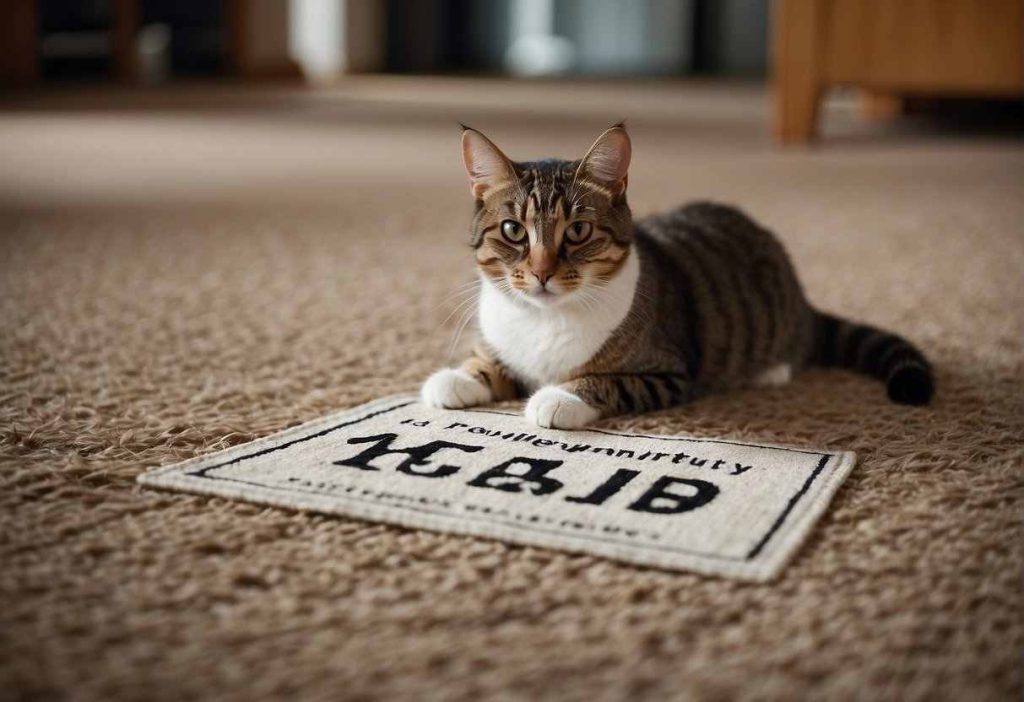
Navigating the tricky issue of your cat’s unexpected bathroom habits? You’ve got questions, we’ve got answers!
What immediate actions should I take if my cat pees on the carpet?
Caught in the act?
Blot up as much urine as possible with paper towels, then clean the area with an enzymatic cleaner to eliminate the scent—important to deter repeat performances.
How can I tell if my cat’s inappropriate urination is due to a medical issue?
Keep an eagle eye out for signs of discomfort or more frequent trips to the litter box. These clues might indicate a trip to the vet is in order.
What are the most effective behavioral modification techniques to stop my cat from peeing on the carpet?
Consistency is key.
You’ll want to restrict access to the crime scene, use positive reinforcement when your furball uses the litter box, and maybe even engage in extra playtime to relieve anxiety.
Does introducing new litter box practices help in stopping cats from peeing on carpets?
Absolutely, you bet it does! Keeping the litter box pristine and in a quiet area can make all the difference. Consider if you’d fancy a porta-potty over a clean restroom!
Are there specific products that can help prevent my cat from peeing outside the litter box?
Certainly! Look into pheromone sprays, enzymatic cleaners, or even a different type of litter. Cats can be picky customers, after all.
Is there a behavioral or medical reason my cat chooses the carpet instead of the litter box?
Oftentimes, yes. Stress, a urinary tract infection, or just plain dislike for the current litter box setup can lead to this carpet-centric choice.
How can I prevent future incidents of my cat peeing on the carpet?
Prevention is about observation and action.
Watch for behavioral cues, maintain a clean and inviting litter box, and don’t forget regular vet check-ups to catch any underlying health issues early.
- The Ultimate Overview to Actual Cash Gambling Establishments - July 1, 2025


